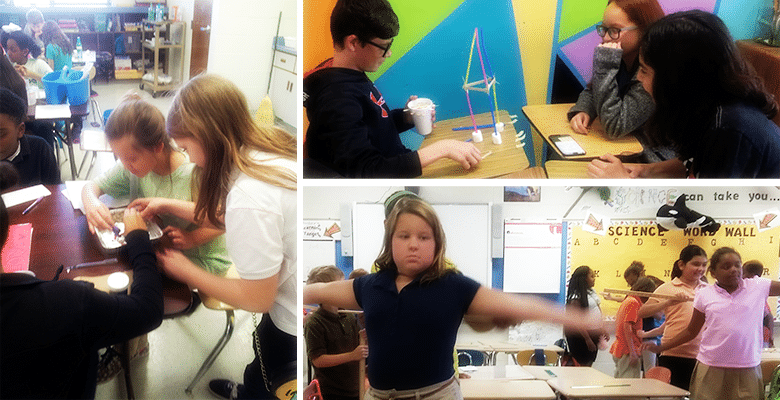Innovation Is Everywhere
Education Domain Blog

Originally published in Education Week under the title, “Stop Ignoring the Innovation That Happens in Traditional Public Schools.” Reprinted with permission from the authors.
When students at Childersburg Middle School head to the library, there’s far more to do than read a book. Two summers ago, their teachers divided the space into a cozy reading area and the “GRID,” a hands-on engineering lab where students work in groups and learn through the process of design. Back in their regular classrooms, teachers guide projects that build on that learning, and that continues online at home.
Though Childersburg sounds like an independent school with lots of freedom and funding, it is actually a traditional public school in rural Alabama. What’s going on there is showing how teachers and students in a variety of district public schools are embracing innovation. But we’ve only just recently learned about Childersburg through the Canopy project, a new effort by the Clayton Christensen Institute to identify promising practices in schools across the United States that have, to date, largely escaped notice.
As program officers at three national education foundations, we know that educators everywhere are making big changes in teaching and learning. But the education community—funders like us, along with state and federal decision-makers, district and school leaders, researchers, and advocates—has not had a ready source of detailed information about innovators outside established networks or major urban centers. As a result, only a few schools gain widespread attention, and models that are relevant to educators working in a variety of contexts remain under the radar.
As program officers at three national education foundations, we know that educators everywhere are making big changes in teaching and learning.
That inspired our support of Canopy, which invites local educators and education experts to nominate their peers for inclusion in a detailed registry of innovation. Canopy has introduced us to schools like Stilwell High School in Oklahoma, where students combine academics with internships and career-readiness coursework, and Barrington Middle School in Rhode Island, where teachers serve as mentors and students design and complete collaborative projects. This group of 235 schools, nearly three-quarters of which had never before appeared on well-known lists or databases, is helping those of us working at a national level look beyond the familiar and better understand how widespread new practices have become.
Such understanding is critical for our roles as grantmakers. While we fund a narrow fraction of education overall, the programs we support tend to attract attention and visibility, including the research that can determine which programs enhance student success.
From our perspective as funders, four key lessons stand out:
- Innovation is happening all across the country, not in a few niche corners as we are sometimes led to believe. The Canopy project has identified change-making schools in urban, suburban, and rural communities in 34 states with the help of local and regional experts on the ground.
- Also contrary to common assumption, most of this work is happening within public school districts. Even with a limited sample size, two-thirds of the schools identified in the Canopy project are traditional public schools.
- Amid a wide range of new models, three approaches appear to have broad adoption: social-emotional learning, project-based learning, and building learner agency through practices like goal-setting.
- Such practices are unevenly distributed across school locations and demographic profiles. For example, higher poverty schools and those serving higher percentages of students of color were less likely to report strategies such as experiential learning. While it’s possible these data reflect the intentional decisions of schools aligned to local community priorities, it is equally plausible that some schools face more barriers to implementing these approaches than others. Clearly, we have more communities and questions to explore.
Despite notable gains in states’ high school graduation rates and a larger and more diverse college-going population than decades past, far too many students lack access to an excellent school experience that supports their full development and prepares them to pursue their goals. By understanding how educators are making changes in their classrooms, we can share those discoveries and help schools to embrace promising new practices in a variety of contexts. These insights also can guide us to the critical next step: looking carefully at how these new models affect student outcomes across diverse environments.
We now know more than ever about what can foster a child’s full potential, including relevant learning opportunities, personalized data-driven supports, the intentional development of social and emotional skills, and a supportive learning community where students feel that they belong. But no single model will work for every community. Schools need a range of proven strategies and a broader array of comparable schools from which they can learn. In lifting up diverse real-world examples from across the country, we can progress toward our ultimate goal: ensuring every school has a roadmap to support all students to succeed.
In lifting up diverse real-world examples, we can progress toward our ultimate goal: ensuring every school has a roadmap to support all students to succeed.
Jenny Curtin, is Senior Program Officer, Education leading the Catalyze New Models portfolio at the Barr Foundation. Britt Neuhaus was a Program Officer leading the Innovative Schools portfolio at the Overdeck Family Foundation. Saskia Levy Thompson is Program Director, New Designs to Advance Learning at Carnegie Corporation of New York.
The Aurora Institute is a member of the Canopy project advisory board and will host a special webinar exploring the project on March 10, 2021. Register to be a part of the conversation.